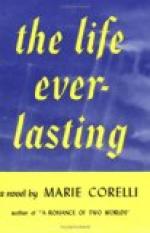My cheeks grew suddenly warm. A curious resentment awoke in me at her words—had I indeed no lover? Surely I had!—one that I knew well and had known for a long time,—one for whom I had guarded my life sacredly as belonging to another as well as to myself,—a lover who loved me beyond all power of human expression,—here the rush of strange and inexplicable emotion in me was hurled back on my mind with a shock of mingled terror and surprise from a dead wall of stony fact,—it was true, of course, and Catherine Harland was right—I had no lover. No man had ever loved me well enough to be called by such a name. The flush cooled off my face,—the hurry of my thoughts slackened,—I took up my embroidery and began to work at it again.
“That is so, isn’t it?” persisted Miss Harland—“Though you blush and grow pale as if there was someone in the background.”
I met her inquisitive glance and smiled.
“There is no one,”—I said—“There never has been anyone.” I paused; I could almost feel the warmth of the strong hand that had held mine in my dream of the past night. It was mere fancy, and I went on—“I should not care for what modern men and women call love. It seems very unsatisfactory.”
She sighed.
“It is frequently very selfish,”—she said—“I want to tell you my love-story—may I?”
“Why, of course!” I answered, a little wonderingly, for I had not thought she had a love-story to tell.
“It’s very brief,”—she said, and her lip quivered—“There was a man who used to visit our house very often when I first came out,—he made me believe he was very fond of me. I was more than fond of him--I almost worshipped him. He was all the world to me, and though father did not like him very much he wished me to be happy, so we were engaged. That was the time of my life—the only time I ever knew what happiness was. One evening, just about three months before we were to be married, we were together at a party in the house of one of our mutual friends, and I heard him talking rather loudly in a room where he and two or three other men had gone to smoke. He said something that made me stand still and wonder whether I was mad or dreaming. ‘Pity me when I’m married to Catherine Harland!’ Pity him? I listened,—I knew it was wrong to listen, but I could not help myself. ’Well, you’ll get enough cash with her to set you all right in the world, anyhow,’—said another man, ’You can put up with a plain wife for the sake of a pretty fortune.’ Then he,—my love!— spoke again—’Oh, I shall make the best of it,’ he said—’I must have money somehow, and this is the easiest way. There’s one good thing about modern life,—husbands and wives don’t hunt in couples as they used to do, so when once the knot is tied I shall shift my matrimonial burden off my shoulders as much as I can. She’ll amuse herself with her clothes and the household,—and she’s fond of me, so I shall always have my own way. But it’s an awful martyrdom to have to marry one woman on account of empty pockets when you’re in love with another.’ I heard,—and then—I don’t know what happened.”




